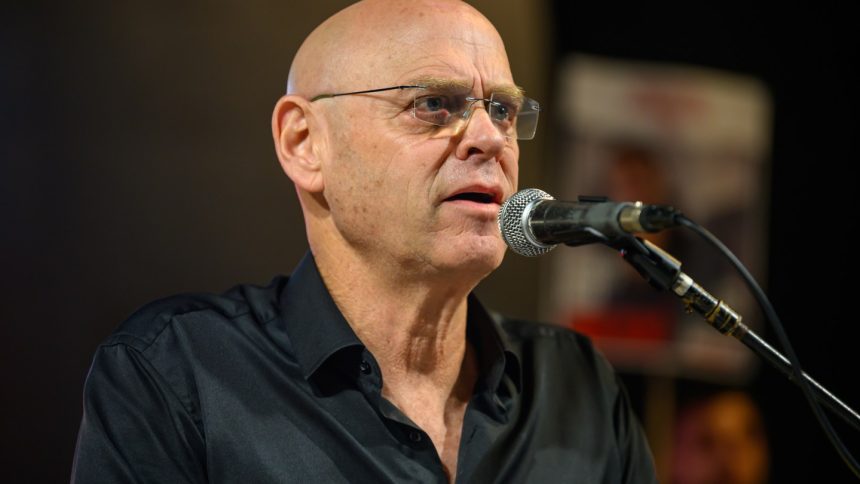Toronto: Director of Reinstated TIFF October 7 Film Says He Feels Vindicated But “Battered”
Perhaps one of the more unusual aspects of the whole Toronto Internation Film Festival controversy over The Road Between Us, says the director of the reinstated October 7 documentary, is how much real life mirrors the film.
After all, Barry Avrich’s movie focuses on a retired Israeli general in Tel Aviv who pulls together with his wife and several military personnel he meets along the way to rescue his son, daughter-in-law and grandchildren from a kibbutz near the Gaza border on Oct 7. And The Road Between Us itself will be shown at TIFF, thanks to its own show of unity from Jewish groups and pro-Israel advocates to protest the festival’s decision to disinvite it.
“It really is about people coming together,” Avrich said, referring to both aspects.
Avrich was at a Toronto hotel Sunday, sitting alongside his subject, that retired Israeli general Noam Tibon, trying to make sense of some of the stranger weeks a filmmaker has ever experienced leading up to a festival. A veteran Toronto fest director — he normally makes less geopolitical movies about the likes of Lew Wasserman and Dominick Dunne — Avrich found his film last month first invited personally by TIFF chief Cameron Bailey, then revoked a few days later on alleged security and footage-clearance concerns (much of the movie uses Hamas bodycam footage, which can be, rather obviously, hard to clear). Then, after a public outcry from many Jewish groups as well as Hollywood personalities including Debra Messing and Amy Schumer, the film’s invite was reinstated. The Road Between Us will now screen once, on Wednesday.
You Might Also Like
“I’ll be honest. I did not feel exhilarated at the end,” Avrich says of the backroom saga. “It wasn’t like all this pressure and the film festival said, ‘OK, you’re back in.’ It wasn’t that easy. It was a complexity of ‘how about if you do this, how about if we do that.’ And I said ‘no, I want the film at the festival and this is how I want it shown.’ I came out of it rather battered.”
He added, “We got what we wanted and that was great. But I didn’t feel victorious. Why didn’t this happen in the first place?”
The victory will in a sense be had by filmgoers, who will have a chance to see one more powerful story set in a conflict that recently has been filled with them on all sides, including Silver Lion winner The Voice of Hind Rajab. In this case, a hopeful story.
Far from a hectoring political film, the documentary, which The Hollywood Reporter has seen, is a tight personal tale, a kind of vigilante thriller of the Taken variety that just happens to be set against the backdrop of the bloody terrors of an anti-Jewish pogrom. If We Will Dance Again, the Emmy-winning story of the Nova festival, laid out the horrors of that day in Israel, this new work shows a sinewy strain of hope as one retired general and his wife set out to rescue their family instead of sitting helplessly in their home in Tel Aviv. The son he rescued, a journalist in his own right, narrates the story with his wife from the safe room near the Gaza border as the elder Tibons recreate their journey to get to him, a journey that takes many surprising turns.
“It’s a movie about a family. [The] relationships between parents, kids and grandkids,” Tibon said on Sunday. “I think it’s a story that talks to people all over the world because at the end of the day, family is what’s important to us.”
Avrich adds, “It’s not really a political film. It’s wrapped in the flag of a family, not a country.”
Without a press screening or second public screening — The Road Between Us will play just once, on the relatively late festival date of Sept. 10 — some have asked whether the movie is being shadowbanned. Avrich says he did wish for more or higher profile showings. But he said that simply getting a screening was enough.
“A lot of the reasoning behind pulling the film was illogical to me,” he said. “But we’re getting it out, all 1,800 seats are sold out, and now we can start getting it into the world,” he notes of a film that is seeking distribution. “Quincy Jones was a mentor to me, and he used to say ‘you can’t have a beautiful picture without a negative.’ I’ve been thinking about that a lot here.”
The Road Between Us continues to draw protest. On Saturday, a small group gathered near a main TIFF intersection to register its objection to the film’s inclusion. The protests can be a little strange to see given that a number of films spotlighting the other side of the Palestinian-Israeli conflict, including historical drama Palestine 36 and The Voice of Hind Rajab, are being shown in this Canadian city with no comparable objection.
Avrich says he’s a little confounded by the protests. “If you have an issue with it, don’t go. What is the point of protesting a film at a festival? The only way you can protest art is don’t buy a ticket to it.”
Tibon says he believes the universal aspect will resonate for anyone who does buy a ticket.
“It’s a good story to make people think about themselves and their own families. Does it really matter if it’s Jewish, Christian or Muslim or anything else? Each of us has a family, and we have to think about what we would do if they were suddenly under risk,” he said.
“I took the festival’s decision personally,” Tibon added. “But I felt justice and common sense won. Now we’re focused on one thing: let’s do a good show that people will come and see it from all over the world, and they can judge for themselves.”







